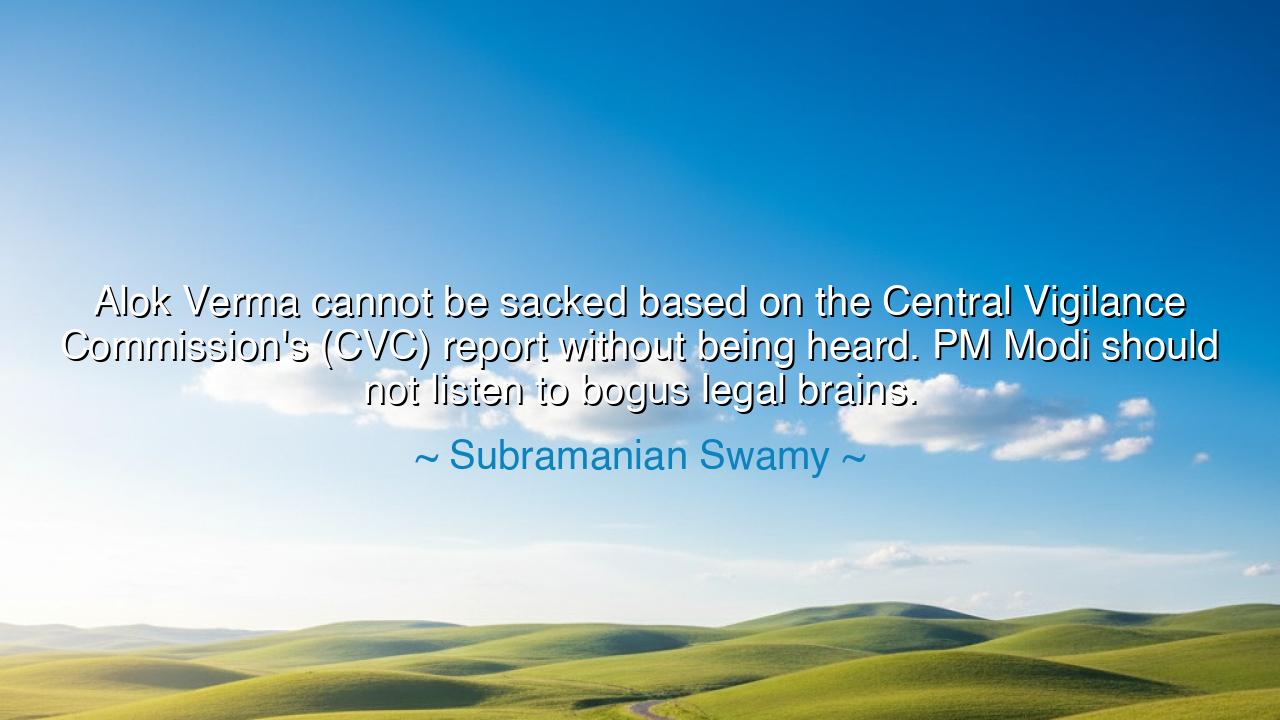
Alok Verma cannot be sacked based on the Central Vigilance
Alok Verma cannot be sacked based on the Central Vigilance Commission's (CVC) report without being heard. PM Modi should not listen to bogus legal brains.






When Subramanian Swamy declared, “Alok Verma cannot be sacked based on the Central Vigilance Commission’s (CVC) report without being heard. PM Modi should not listen to bogus legal brains,” he spoke not only as a politician defending a man, but as a guardian of due process, invoking one of civilization’s oldest principles — the right to be heard. In these words lies a call to protect the rule of law from the poison of expediency. Swamy, known for his sharp intellect and fearless rhetoric, was not merely protesting a political act; he was reminding a nation that justice without hearing is tyranny wearing the mask of legality.
The origin of this statement lies in the controversy surrounding Alok Verma, then Director of India’s Central Bureau of Investigation (CBI), who was abruptly removed from his position amid allegations of corruption and misconduct. The Central Vigilance Commission (CVC) had submitted a report against him, leading to his ouster. Yet Swamy’s voice rose against this action, warning that no man, however accused, should be condemned unheard. His words were not just about Verma — they were about the principle that anchors every just society: that power must not silence defense, and that even the accused deserve a hearing before judgment.
This idea — that no person should be punished without being heard — is as ancient as justice itself. From the courts of Rome to the halls of India’s democracy, the principle of audi alteram partem — “hear the other side” — has guided kings and courts alike. The CVC report, in Swamy’s view, could not stand as the sole justification for dismissal. To do so would make authority supreme and fairness secondary. He urged the Prime Minister not to be misled by what he called “bogus legal brains” — those who twist the law to serve convenience rather than truth. His rebuke was not merely legal but moral, a reminder that wisdom must guide law, not cunning.
History, too, bears witness to the disasters born of silenced voices. When Socrates was condemned to death by the Athenian court, he was given the chance to speak — and he used it to defend not his life, but the principle of truth. When Jesus was brought before Pilate, the trial was a mockery of justice — hurried, politicized, and predetermined. And in every age since, whenever rulers have punished without listening, justice has withered, and tyranny has grown. Swamy’s words draw from that same well of ancient wisdom: that the health of a nation’s institutions depends not on their might, but on their fairness.
The phrase “bogus legal brains” carries its own sting — a warning against those who hide manipulation behind intellect. Swamy’s admonition reveals his deep mistrust of those who use the language of law to distort its spirit. For the law, he implies, is not a weapon for political convenience, but a shield for truth and order. A legal system led by cleverness rather than conscience becomes a theatre of hypocrisy. To reject the advice of “bogus legal brains” is to choose principle over power, truth over tact.
Through this statement, Swamy not only defends an individual but calls for moral courage in leadership. He appeals to the Prime Minister — and by extension, to every ruler — to act not on whispers or half-truths, but on justice that has been tested by reason and fairness. The power to sack must be balanced by the duty to hear, for leadership without restraint leads only to chaos. It is not the mark of weakness to listen before judging; it is the highest mark of wisdom.
The lesson in his words endures beyond the politics of India. Wherever authority exists, so too must the right to be heard. In governments, in workplaces, even in families, the failure to listen is the first step toward injustice. Let every citizen remember: fairness is not born from victory, but from patience. Do not rush to condemn before you understand; do not trust the brilliance of argument over the light of truth. For as Subramanian Swamy reminds us, the strength of a nation lies not in its punishments, but in its protections — in the sacred space where even the accused may speak, and justice, hearing all sides, may truly prevail.






AAdministratorAdministrator
Welcome, honored guests. Please leave a comment, we will respond soon